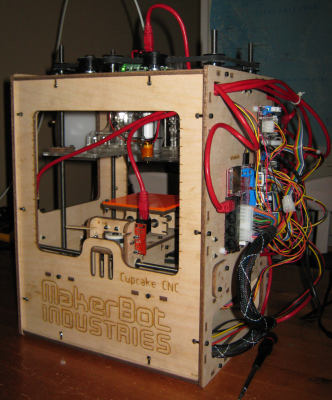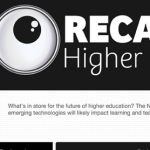MakerBot Academy: A 3-D Printer In Every Classroom
By Paul Glader on December 31, 2013
Domestic, Education Quality, K-12, Personalized Learning, Public, Required, Startups, STEM, Technology
By Anya Kamenetz, The Hechinger Report
A MakerBot is a tabletop-sized device that takes digital designs and builds them in the real world, layer by thin layer, out of a plastic-like roll of filament derived from corn. You can create or customize any design you can think of– a working prosthetic hand, or a scale model of the Eiffel Tower, or a set of chess pieces–or download someone else’s design from the Thingiverse, MakerBot’s free online library. Comparatively low-cost and easy to use, MakerBots are the popular edge of what technology observers and futurists–even President Obama–call a “new industrial revolution” of mass customization, where design is democratized and manufacturing is one day as decentralized as knowledge production has become. Plus, they’re just wondrously cool.
MakerBot CEO Bre Prettis used to teach public school in Seattle. “It’s always been a dream of mine to get this into more classrooms,” he says. This week he announced the MakerBot Academy to do just that.
Teachers who want a MakerBot for their classroom are asked to register at the educational donation site DonorsChoose. There, their project can be funded through tax-deductible donations by individual donors. The architectural software company Autodesk has also agreed to sponsor a number of MakerBots, as has the director of MakerBot’s parent company, and Prettis personally is committed to funding them for high schools in his current home neighborhood of Brooklyn. For any teacher, MakerBot is making available a package of the printer itself, three rolls of filament, and a service and support plan at $2000, a $700 savings over the retail cost.
“A MakerBot is a manufacturing education in a box; it unlocks creativity and gets kids thinking about how things work,” Prettis says. He sees the machines functioning in classrooms in a range of ways.
On a practical level, MakerBots could be a relatively affordable way to furnish a steady stream of new materials and supplies for classrooms that might not otherwise be able to afford them, from a detailed model of a human heart to simple machines for use in physics. To start out, DonorsChoose told MakerBot that one of the most commonly requested items are “math manipulatives,” the blocks, wedges, counters and other toys that help kids learn geometry, arithmetic and more. MakerBot put out a design challengeto its Thingiverse community to submit ideas for new and creative manipulatives that can be downloaded, printed and used in classrooms. It’s exciting to think about students and teachers in different communities creating and sharing their own designs for classroom purposes.
MakerBot is going to be sharing curricula created by teachers and companies like Autodesk to help teachers work the 3-D printers into lesson planning from kindergarten through high schools. Within the world of K-12 innovation, we’re oftentimes focused on the use of handheld devices with screens, but learning can be an intensely tactile process, and the MakerBot taps into that. “A MakerBot is actually a great bridge between the virtual and physical world,” Prettis says.
This post was produced by The Hechinger Report, a non-profit journalism organization housed at Columbia University in New York City.
Related Posts


Tips & Pitches
Latest WA Features
-
Online Courses Are Expanding, Along With Questions About Who Owns The Material
-
Why Size Matters: Consolidation Sweeps Across US Higher Ed
-
Trend: Corporate U Employers Offering Just In Time Education To Workers
-
Subterfuge & Skullduggery In The College Rankings Game
-
“Instreamia” Shakes Loose Moss By Launching Spanish Language Mini-MOOC
Domestic, Education Quality, For-Profit, Friend, Fraud, or Fishy, K-12, Legislation, Opinion, Personalized Learning, Regulatory, Required, Universities & Colleges - Apr 29, 2014 - 0 Comments
Michael Horn: NCAA March Madness Followed By April Blunder In Online Learning
More In For-Profit
- The Economy Is Forcing Tuition To Fall Rapidly At Private, For-Profit Colleges
- Kamenetz: Jeb Bush As Controversial Leader Of Aspen Task Force on Learning & The Internet
- Columnist Ryan Craig: The Best Of Times Could Return As For-Profit Edu Invests
- Bubble Analysis: Trace Urdan on Why This Era of Ed Investing Could Be Different
- A Blended Path? How American Honors Cuts Cost of Four Year Degree by Over a Third
Community Colleges Cost of Education Domestic For-Profit Required Student Loans Universities & Colleges
Cost of Education, Domestic, Education Quality, Friend, Fraud, or Fishy, Opinion, Personalized Learning, Required, Technology, Universities & Colleges - Jan 17, 2014 - 0 Comments
Online Education As A Postmodern Societal Response
More In Technology
- MakerBot Academy: A 3-D Printer In Every Classroom
- Michael Horn: A Look Behind The Curtain At How A MOOC Is Made
- Koller, Khan and Agarwal At The NYT’s Schools of Tomorrow Conference
- Video: New NESTA Report, Three Steps To Assess Digital Innovation in Education
- Norwegian Teens Publish Their Own Guide To Teaching and Learning In Web 2.0
Blended Learning Education Quality International K-12 Open Source Education Personalized Learning Required Technology
Domestic, Education Quality, For-Profit, Friend, Fraud, or Fishy, K-12, Legislation, Opinion, Personalized Learning, Regulatory, Required, Universities & Colleges - Apr 29, 2014 - 0 Comments
Michael Horn: NCAA March Madness Followed By April Blunder In Online Learning
More In Friend, Fraud, or Fishy
- Online Education As A Postmodern Societal Response
- Apple Tightens Its 94% Choke-hold On The Education Tablet Market
- Michael Horn: Why Obama’s Proposals Won’t Entirely Revolutionize HigherEd
- Columnist Ryan Craig: The Curious Case Of HigherEd Accreditation
- McGraw-Hill Executive Speaking About Big Data: “Don’t look at us, look at Joe Camel”
Domestic Ebooks Education Quality Ereaders Ethics Friend, Fraud, or Fishy K-12 Publishers & Curriculum Required Textbooks











Reply